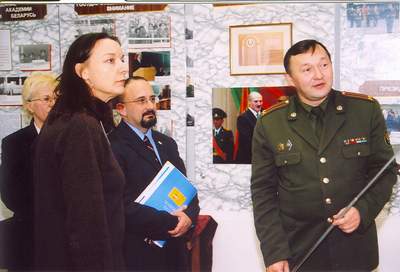
The project evaluation was initiated by the UNFPA Office in Belarus. The evaluation team included Riet Gronen, UNFPA consultant on socio-cultural issues and gender analysis, Doctor Tunga Tuzer, coordinator of the project for HIV/AIDS prevention in the armed forces of Turkey, Vasily Matyukevich, senior epidemiologist of Belarus’ armed forces and representatives of the Belarusian Center for Hygiene, Epidemiology and Public Health and the Central Hospital of armed forces. The experts examined the project documents, information and educational materials and met with the representatives of the Ministry of Defense, officers and cadets of the Ministry Academy and garrison officers who attended training organized by the project.
The evaluation findings suggest that the project has been successful and that the intended outcomes have been achieved. The experts noted that support of HIV/AIDS/STI prevention efforts provided by the specialists of the Belarusian Ministry of Defense contributed to successful implementation of the project and achievement of the intended outcomes. The Academy has demonstrated that it has internal resources for the elaboration and implementation of the innovative program for HIV/AIDS/STI prevention and is capable to ensure supportive environment which can be regarded as the major achievement of the project given its short duration and limited budget.
It has been concluded that the current HIV/AIDS/STI Prevention Program of the Ministry of Defense and the Military Academy is a comprehensive program properly reflecting the specifics of preventive work with military personnel and engaging cadets, soldiers and officers of all combat arms and levels of the armed forces. The experts have praised excellent knowledge of cadets and officers especially platoon leaders about HIV/AIDS/STI prevention. Upon completion of the project the experts have recommended:
- to conduct behavior models survey among certain groups in the Belarusian armed forces with the purpose to get reliable and realistic information about sexual and risk behavior of military personnel and to improve HIV/AIDS prevention programs;
- to conduct a separate survey for measuring accessibility (cost, availability, quality and etc.) of condoms for soldiers and officers of different units of the Belarusian armed forces;
- to expand training program on HIV/AIDS/STI prevention by incorporating such issues as family relations, prevention of violence against women and sexual education of teenagers;
- to involve female staff in elaboration and implementation of HIV/AIDS/STI prevention programs and, if necessary, to develop special materials for training female military personnel.
Based on the findings of the project evaluation, the experts have recommended to examine the possibility of its replication in other power ministries (for example in the State Border Guard Committee, the Ministry of Interior and the Ministry of Emergency Situations) with the purpose of disseminating the project experience and enhancing the quality of prevention efforts. The representatives of the Belarusian Military Academy have proposed to establish a permanent training facility for the representatives of power ministries which will be conducted by teachers who had attended the project training. The experts have also proposed to organize a regional workshop for CIS and East European countries covering the issues of HIV/AIDS prevention in the armed forces.
The experts believe that by supporting the project covering many servicemen the UNFPA, UNAIDS and the Military Academy have made a sizeable contribution to the implementation of the National Program on HIV/AIDS Prevention in Belarus. In this regard the United Nations Population Fund, the Joint United Nations Program on HIV/AIDS and other international organizations have been recommended to extend provision of technical and financial support to the Ministry of Defense and the Military Academy of the Republic of Belarus to enhance efforts on HIV/AIDS/STI prevention.
BRIEF SUMMARY OF THE PROJECT OUTCOMES:
Within the framework of the project a group of the Belarusian teachers have been trained in the technique of conducting workshops on HIV/AIDS/STI prevention in the armed forces. HIV/AIDS/STI prevention has been incorporated in the curricular of the courses for upgrading qualification of the officers in the form of a three-day workshop. In addition, 10-hour training on HIV/AIDS prevention has been incorporated in the course «Moral and Psychological Training» which is mandatory for all cadets of the Military Academy.
During the implementation of the project 1178 Belarusian officers attended the training workshops at the qualification upgrading courses and the on-site workshops organized in the military units and garrisons.
The newspaper of the Ministry of Defense regularly publishes the information about HIV-infection, drug abuse and sexually transmitted infections. These issues are also covered in the TV program «Military TV» and the programs of the national radio channel. The Ministry of Defense has published the guidelines for military personnel «Serving the Motherland» which has a special anti-AIDS section. Two special guidelines on HIV/AIDS/STI prevention in the armed forces have been developed.
Commanding officers and medical service staff organize information and promotion events and disseminate booklets and special materials activities in the military units of the Belarusian armed forces. Information and educational materials developed within the project framework will soon be presented at the web-site of the armed forces of the Republic of Belarus.

